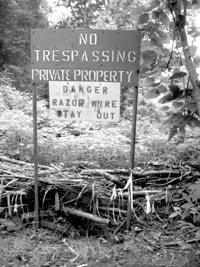NEWS- Razor's edge: Presley's case gets new life
The latest legal round in the Shirley Presley razor wire case has Charlottesville officials all shook up. On Friday, September 22, a three-judge panel of the Fourth Circuit Court of Appeals ruled that Presley, who erected razor wire on her property to stop trespassers, may go forward with her $1.5 million civil suit against the city and the Rivanna Trail Foundation for violating her Fourth Amendment rights. The Court overruled a 2005 decision by U.S. District Court Judge Norman Moon that had dismissed her suit.
And though over the past four years, the City has been working to force Presley to remove the wire– taking her to court, and when that failed, quietly vowing to rewrite the ordinance– assistant city attorney Lisa Kelley now says the recent ruling has put those plans on hold.
"Nobody would have predicted it would be read that way," says Kelley of the appeal. "At this point," she adds, "we need to see how things sort themselves out in the pending litigation against the city before we try to fix what's wrong with our ordinance."
The conflict began in 2002 when Presley realized hikers and bikers were traipsing across– and occasionally camping on– the lower portion of her Bland Circle property beside the Rivanna River.
Recently widowed, a frightened Presley learned that the Foundation had included her property on its trail map without asking her permission. The Foundation, which claimed that failing to ask Presley was an oversight, teamed with the city to ask Presley to grant an easement. She declined that request and demanded that the trail be rerouted and the maps redrawn. Though the Foundation eventually complied with her request and redirected the path traffic out onto River Road and around her house, the trespassing on Presley's land continued, and she began taking ever more drastic measures to protect her property.
After her yellow "no trespassing" signs and a heaping brush pile failed to stop hikers, some trespassers became increasingly threatening.
"I'm from California and we believe in freedom," raged one brush-pile-dismantling trail-goer encountered by a Hook reporter in 2002. But while some became enraged that she wasn't more civic-minded, property rights supporters rallied behind Presley.
"There's a word for using someone else's property without asking permission," wrote Richard Sincere in a letter to the editor published in the Hook on July 11, 2002. "It's called stealing."
The debate, the subject of the Hook's July 4, 2002 cover story, "Trail Nix: Rivanna neighbor just says no to hikers," heated up, and soon after, Presley erected two 30-foot stretches of razor wire across the trail approximately 18" off the ground.
That action angered city officials, who believed the wire violated a city ordinance, and they sent Presley repeated orders to remove it. But on the advice of Fred Payne, her attorney at the time, Presley ignored the city's demands. When the case went to Charlottesville District Court in October 2004, Judge Robert Downer ruled in Presley's favor.
While acknowledging that the intention of the ordinance was probably to ban razor wire from residential property and require its erection at a safe height on commercial property, Downer ruled that the ordinance as written prohibited only razor wire that "enclosed or partially enclosed" property. Presley's wire– stretched in a straight line– failed to meet that definition, Downer ruled.
Armed with that victory, Presley charged ahead with her civil suit.
Though U.S. District Court judge Norman Moon dismissed it on October 7, 2005, ruling that the city simply "appropriated an easement" across Presley's property and that "such a taking cannot rise to the level of a Fourth Amendment seizure," the recent Court of Appeals decision means the case may be back on his docket in the near future.
Presley's current attorney, Debbie Wyatt, says she and her client are pleased with the recent decision, but Wyatt says Presley continues to suffer from trespassers.
"The razor wire has been cut multiple times, and it's had to be repaired with a chain between cuts," says Wyatt. This past spring in particular, Wyatt says, Presley dealt with vandalism. Four plants Presley had put in as a barrier "were literally dug up, and you can see the holes where they were," says Wyatt. "And there's been some trampling of her other vegetation."
The Rivanna Trails Foundation's Richmond-based attorney, Stanley Wellman, says he's pleased the Fourth Circuit threw out Presley's charges of substantive and due process violation. Both he and the attorney representing Charlottesville in this case, Al Inigo, say they try to get the Fourth Circuit to rehear the Fourth Amendment portion of the case with a full panel of 13 judges. In addition, the Foundation, the City, or Presley could file a motion for summary judgment before Judge Moon, asking him to render a decision before the case goes to trial.
Inigo, Wellman and Wyatt concur on one thing: the recent 4th Circuit decision doesn't give either side an advantage in court– it simply allows the case to be heard. And while Wyatt is happy her client has a second chance, she admits it's dangerous to predict outcomes.
"The law," she says, "is full of reversals of fortune."

An Appeals Court green-lighted Shirley Presley‘s $1.5 million suit.
FILE PHOTO BY JEN FARIELLO
 The coils of razor wire remain on Presley's property, though they have been cut and repaired with portions of chain.
The coils of razor wire remain on Presley's property, though they have been cut and repaired with portions of chain.
FILE PHOTO BY HAWES SPENCER
#